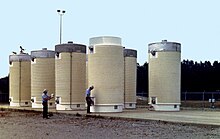Radioactive waste
Radioactive waste is a term used for certain substances that are radioactive and that are no longer useful. Most radioactive waste is a by-product of operating nuclear power plants. Certain treatments in hospitals use radioactive substances. Scientists doing certain kinds of research use radioactive substances. Nuclear weapons also produce radioactive waste. Low-level radioactive wastes are radioactive gases, solids, or liquids that give off small amounts of ionizing radiation. High-level radioactive wastes give off large amounts of ionizing radiation.


Radioactive waste is dangerous to the environment, and there are many regulations about transporting it, handling it, and processing it in such a way that the dangers are reduced. They can contaminate water and affect the living organisms. Storage of radioactive waste must be guaranteed for thousands of years, until it decays sufficiently to be safe to the environment and its inhabitants. Radioactive waste can be stored by deep geological burial or by dry cask storage. Dry Cask Storage is large cylinders of concrete and steel that are used to hold 10 or more metric tons of high-level radioactive waste. The U.S. currently has no long-term radioactive waste storage site. In 1987 Yucca Mountain, Nevada was a candidate for radioactive waste storage, but was shut down.